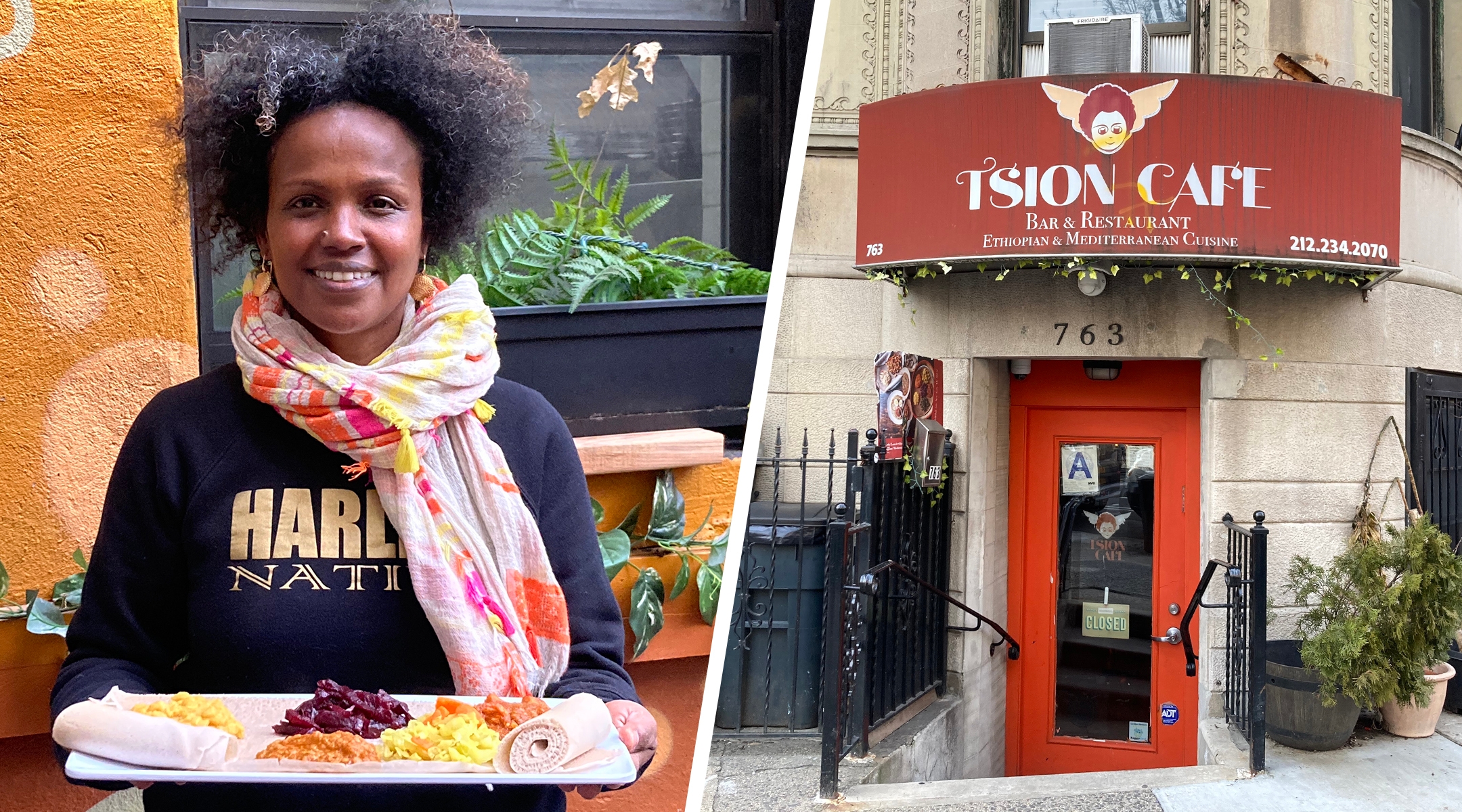(New York Jewish Week) — Beejhy Barhany proudly showcases her Ethiopian-Israeli Jewish identity at her Harlem restaurant, Tsion Cafe.
The eatery has garnered rave reviews ever since it opened in 2014. And now, in the wake of Israel’s war with Hamas and the subsequent rise in antisemitic incidents across the city, Barhany is doubling down on her mission to “celebrate Jews throughout the diaspora”: The cafe is now certified kosher and fully vegan.
“What pushed me towards [going kosher] is the whole ordeal of what’s happening towards Jews, as a whole, since Oct. 7,” Barhany, sitting at a table in her brightly decorated, slightly subterranean space on St. Nicholas Ave., told the New York Jewish Week .
“I am proud of my identity, being a Black Jewish woman here in the U.S., in Harlem, and I felt like, you know, what is better to illuminate, to shine and showcase who I am — no matter what, even though the hatred towards us has increased — and become fully kosher,” added Barhany, 48, who has lived in the neighborhood more than 20 years.
Like many Jewish and Israeli restaurants in New York City, Barhany said Tsion Cafe has experienced antisemitic vandalism, including swastika graffiti, in recent months as Israel’s war with Hamas wages on. “We’ve been persecuted for thousands of years — I don’t think this will stop us from our existence,” she said, pointing out her restaurant’s name is an explicit reference to the Hebrew word for Zion, or Jerusalem.
“It’s a beautiful way to celebrate Jewish diversity; it’s a very easy tool to showcase food,” Barhany said of her shift to a vegan and kosher certified operation.
The change, she said, means Jews and non-Jews of all levels of observance and with various dietary restrictions can dine together at the cafe, “to be a cohesive, united Jewish mosaic diversity that I encourage, just by sitting and breaking bread together.”
Tsion Cafe’s updated website says its “a place with Pan-African love, Black Israeli pride and a passion for delicious vegan food backed by a full bar with international beers and wines.” On the menu are classic vegan Ethiopian dishes, including gomen (braised collard greens) shiro wat (chickpea stew) and, of course, injera, the fermented teff flatbread which is used, in lieu of utensils, to sop it all up. But the menu also leans into more global cuisine, including Yemeni malawach and West African jollof rice.
“Jews — we’ve been throughout the diaspora, different countries, different parts of the world, and we adopt the cuisine of that particular country,” Barhany said. “You adopt it and you make it yours. That’s the beauty of Jewish food as a whole, right? I think Jews have every right to claim food that they’ve been growing up with and call them Jewish food.”
When Barhany announced the going-kosher news on Tsion Cafe’s Instagram earlier this month, the response was overwhelmingly positive — ”Amazing!” was a popular comment. Though the restaurant shifted to fully vegan menu at the end of last year, and has been certified kosher since last month, Tsion Cafe plans to officially launch its new kosher menu with an event Feb. 13 at 6 p.m. featuring live music, a traditional Ethiopian coffee ceremony and, of course, “delicious food.” (Despite the nor’easter predicted for New York City on Tuesday, as of press time the event is proceeding as scheduled.)
According to Rabbi Andre Malek of RAM Kosher K-V, who specializes in kosher certifications for vegetarian and vegan restaurants — including Tsion Cafe — obtaining kosher certification is good for business. In New York, Malek said, restaurants can expect a 25% to 30% bump in business “if they become kosher in a nice Jewish area.”
Sugar Hill, the Harlem neighborhood where Tsion Cafe is located — on the West Side between 148th and 149th Streets — isn’t exactly a Jewish area, but the Jewish community is growing there, Malek said, and it is easily accessible from other areas of Jewish concentration. “You’re gonna have the kids from the Jewish Theological Seminary, Columbia, Barnard,” Malek said, pointing out that the uptown neighborhoods of Washington Heights and Inwood, close to the Modern Orthodox flagship Yeshiva University, is also nearby.
Malek charges $3,000 annually, or $250 a month, for kosher certification, which includes an initial deep-cleaning and kashering process, as well as monthly inspections. “I’m trying to make it as affordable as possible,” Malek said. “It’s not about the money — it’s about making sure the place is kosher.”
Barhany declined to comment on the expenses related to obtaining kosher certification, though she did say that one major project was replacing the dinnerware — used porcelain, because it is porous, cannot be made kosher — though she also pointed out that by going vegan, she now saves a considerable amount of money on the proteins she serves to her customers. (Beans, after all, are far less expensive than beef, fish or chicken.)
According to Barhany, going kosher was an attractive prospect simply because there isn’t kosher dining in the immediate vicinity. “Targeting a new market, Jews that wanted to try Ethiopian food so bad, I think the time is right to come and immerse [themselves] in the delicious flavors of Ethiopia,” said Barhany, who immigrated to Israel from Ethiopia as a young girl, arriving in Israel with her family in 1983. She lived in Ashkelon and a kibbutz before joining the army, and decided to relocate to New York in 2000. “This is the time for a Jewish, kosher place right here in Harlem.”
“This is who I am,” she added. “This is Israel, and I am a Black woman and I’m Jewish. Here I am.”
The New York Jewish Week brings you the stories behind the headlines, keeping you connected to Jewish life in New York. Help sustain the reporting you trust by donating today.





